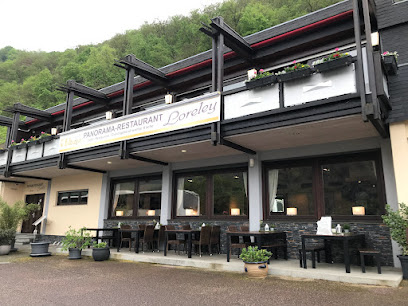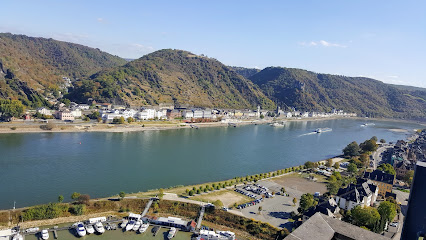
The Enchanting Rhine Valley: Germany's Timeless Gem
The Rhine Valley in Germany is a mesmerizing blend of natural beauty, historic castles, and charming villages. Stretching along the mighty Rhine River, this region offers a picturesque landscape that has inspired poets, painters, and travelers for centuries. From the rolling vineyards that produce some of the world's finest wines to the medieval fortresses perched on hills, every corner of the Rhine Valley tells a story of its rich cultural heritage. Visitors can embark on scenic river cruises, revealing the valley's splendor from the water. Each bend in the river unveils stunning vistas of terraced vineyards and fairy-tale castles, such as the iconic Marksburg and Rheinfels castles. The quaint towns of Bacharach, Rüdesheim, and Boppard are perfect for leisurely strolls, offering a glimpse into the region's vibrant traditions and warm hospitality. For those seeking outdoor adventures, the Rhine Valley boasts numerous hiking and cycling trails, such as the Rheinsteig, which promises breathtaking views and a chance to connect with nature. The valley is also renowned for its wine festivals, where visitors can savor local Rieslings and immerse themselves in the festive atmosphere. Whether you're a history enthusiast, nature lover, or wine connoisseur, the Rhine Valley promises an unforgettable experience.
Local tips in Rhine Valley
- Visit during the fall for the wine harvest season and colorful foliage.
- Take a river cruise for the best views of castles and vineyards.
- Explore the Rheinsteig trail for a scenic hike along the river.
- Don't miss the wine festivals in towns like Rüdesheim and Boppard.
- Try the local Riesling wine, famous for its crisp and refreshing taste.
The Enchanting Rhine Valley: Germany's Timeless Gem
The Rhine Valley in Germany is a mesmerizing blend of natural beauty, historic castles, and charming villages. Stretching along the mighty Rhine River, this region offers a picturesque landscape that has inspired poets, painters, and travelers for centuries. From the rolling vineyards that produce some of the world's finest wines to the medieval fortresses perched on hills, every corner of the Rhine Valley tells a story of its rich cultural heritage. Visitors can embark on scenic river cruises, revealing the valley's splendor from the water. Each bend in the river unveils stunning vistas of terraced vineyards and fairy-tale castles, such as the iconic Marksburg and Rheinfels castles. The quaint towns of Bacharach, Rüdesheim, and Boppard are perfect for leisurely strolls, offering a glimpse into the region's vibrant traditions and warm hospitality. For those seeking outdoor adventures, the Rhine Valley boasts numerous hiking and cycling trails, such as the Rheinsteig, which promises breathtaking views and a chance to connect with nature. The valley is also renowned for its wine festivals, where visitors can savor local Rieslings and immerse themselves in the festive atmosphere. Whether you're a history enthusiast, nature lover, or wine connoisseur, the Rhine Valley promises an unforgettable experience.
When is the best time to go to Rhine Valley?
Iconic landmarks you can’t miss
Ehrenbreitstein Fortress
Explore the rich history and stunning views of Ehrenbreitstein Fortress, a majestic landmark overlooking Koblenz, Germany.
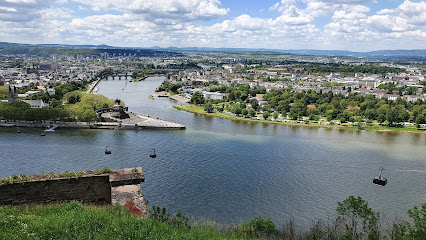
Niederwald Monument
Explore the majestic Niederwald Monument in Rüdesheim, a cultural landmark celebrating German unity with breathtaking views of the Rhine Valley.
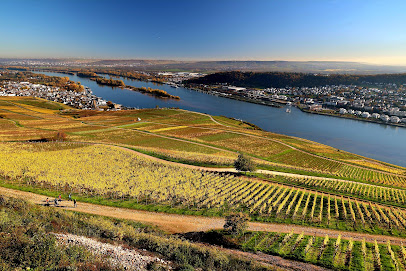
Marksburg
Explore the enchanting Marksburg Castle, a stunning medieval fortress offering breathtaking views and rich history along the Rhine River.
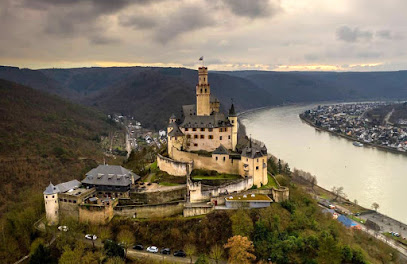
Rheinfels Castle
Discover the enchanting Rheinfels Castle in Sankt Goar, a historical landmark with breathtaking views and rich medieval heritage.
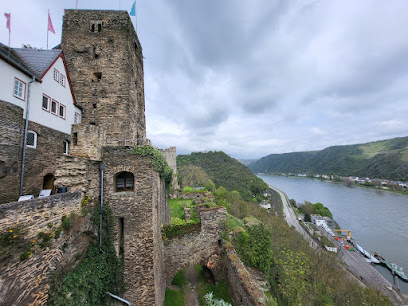
Rhine Gorge
Explore the Rhine Gorge, a UNESCO World Heritage site, where stunning landscapes and historic castles create a magical experience in Germany.
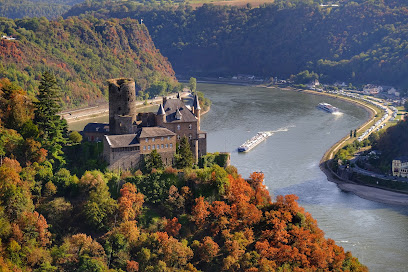
Middle Rhine Valley
Discover the stunning beauty and rich history of the Middle Rhine Valley, a UNESCO World Heritage Site perfect for hiking and cultural exploration.
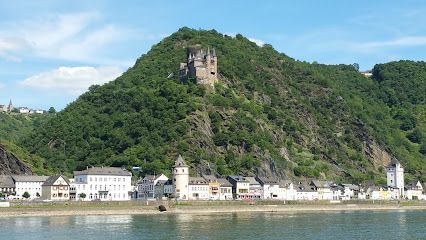
Steingassenturm
Explore the historic Steingassenturm in Oberwesel—offering stunning views and a rich tapestry of history by the Rhine River.
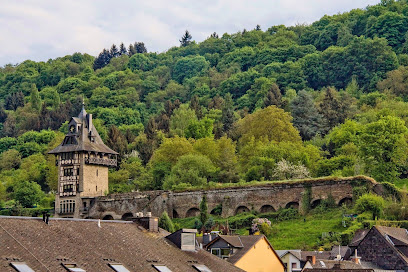
Burg Reichenberg
Discover the enchanting Burg Reichenberg, a medieval castle offering breathtaking views and a rich history in the heart of Reichenberg, Germany.
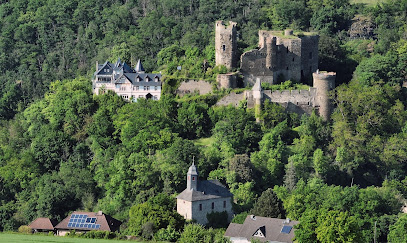
Rheinbalkon St. Goar
Explore the breathtaking views of Rheinbalkon St. Goar, a serene spot for nature lovers and a gateway to the rich heritage of the Rhine Valley.
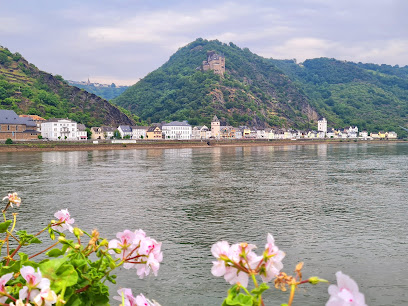
Ausblick Burg Rheinfels, Rhein, St. Goar
Experience the breathtaking views and rich history at Ausblick Burg Rheinfels, a must-visit attraction in St. Goar along the scenic Rhine River.
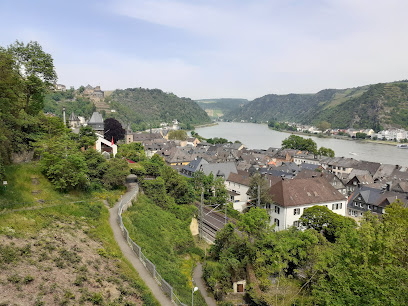
Welterbe Oberes Mittelrheintal
Explore the stunning landscapes and rich history of Welterbe Oberes Mittelrheintal, a UNESCO World Heritage site along the Rhine River in Germany.
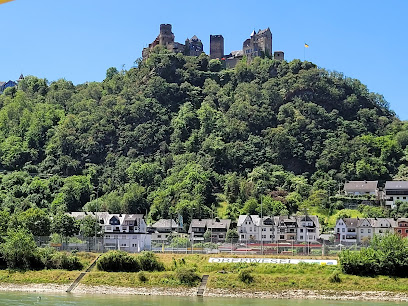
Größte freihängende Kuckucksuhr der Welt
Experience the charm and craftsmanship of the Größte freihängende Kuckucksuhr der Welt, a stunning symbol of German tradition in St. Goar.
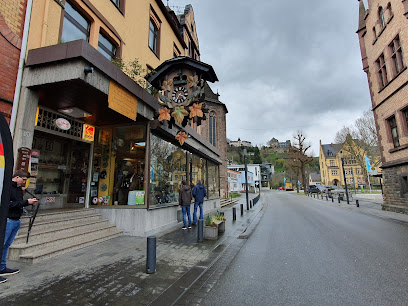
Aussicht über St. Goar und Rhein
Experience breathtaking panoramic views of the Rhine River at Aussicht über St. Goar, a must-see attraction near the legendary Loreley rock.
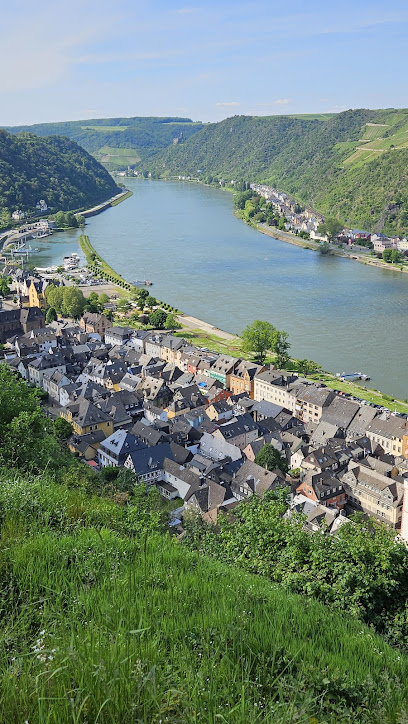
Unmissable attractions to see
Rhine Falls
Discover the breathtaking beauty of Rhine Falls, Europe's largest waterfall, a must-visit natural attraction in Switzerland.
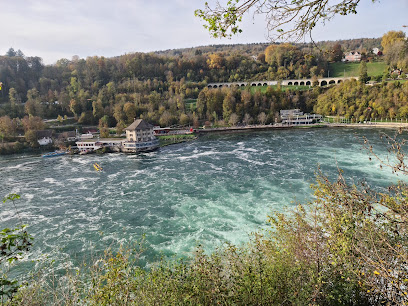
Marksburg
Explore the majestic Marksburg Castle, a well-preserved medieval fortress offering stunning views and rich history along the Rhine River.
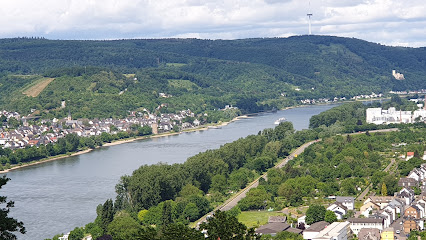
Rheinstein Castle
Explore the medieval charm and stunning views of Rheinstein Castle, a historic gem on the banks of the Rhine River in Germany.
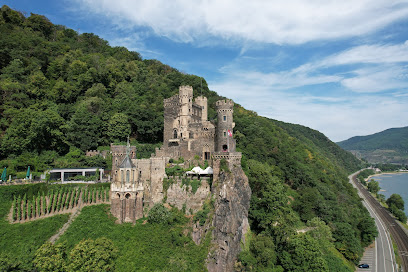
Stolzenfels Castle
Discover the enchanting Stolzenfels Castle, a historic marvel overlooking the Rhine River, offering stunning views and rich cultural heritage.
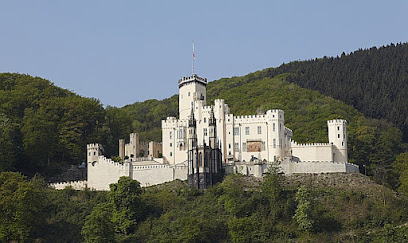
Thurant Castle
Explore the enchanting Thurant Castle, a historical gem in the Moselle Valley, offering breathtaking views, rich history, and unforgettable experiences.
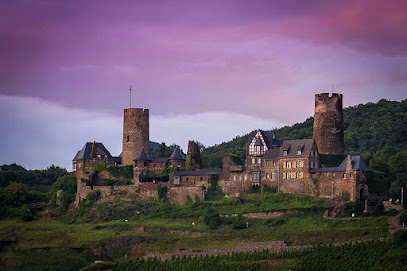
Johannisberg Castle
Experience the enchanting Johannisberg Castle, a historical gem in the heart of Germany's wine country, offering stunning views and rich heritage.
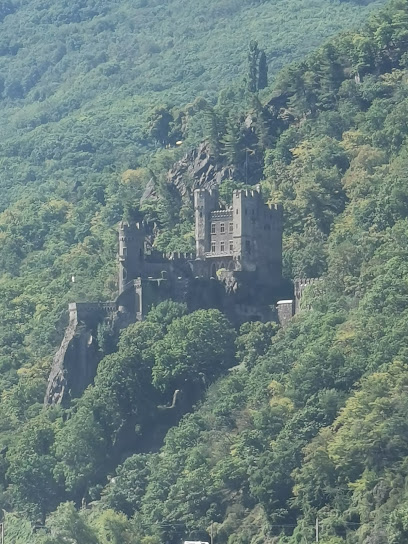
Eltville Castle
Explore Eltville Castle, a stunning historical landmark in Eltville am Rhein, rich in history, beautiful architecture, and surrounded by lush vineyards.
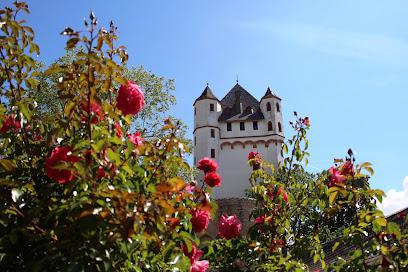
Laufen Castle at the Rheinfalls
Experience the breathtaking views and rich history at Laufen Castle, a historical landmark overlooking the magnificent Rhine Falls.
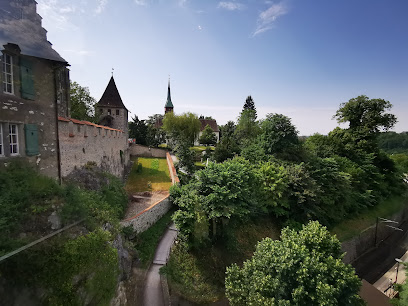
Burg Reichenstein
Explore Burg Reichenstein, a stunning castle in Germany that combines rich history, breathtaking views, and enchanting architecture for an unforgettable visit.
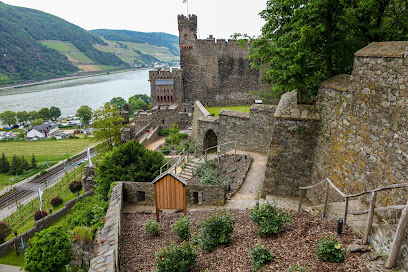
Sesselbahn Boppard
Discover the stunning landscapes of Boppard from the sky at Sesselbahn Boppard, a must-visit mountain cable car attraction in Germany.
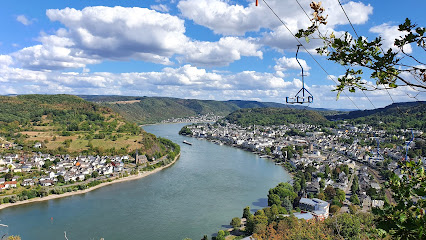
Remstecken
Discover the enchanting Remstecken Wildlife Park in Koblenz, where nature and wildlife come together for an unforgettable experience.
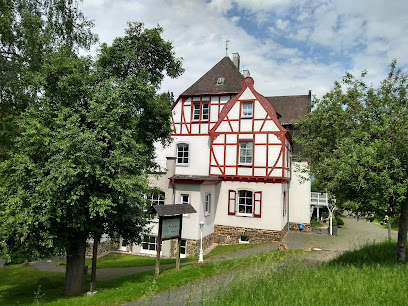
Smilestones AG - Miniaturwelt am Rheinfall
Explore a world of creativity at Smilestones AG, the Miniaturwelt near the stunning Rhine Falls, perfect for families and all ages to enjoy.
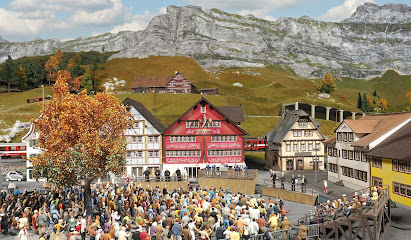
Pfalzgrafenstein Castle
Explore the enchanting Pfalzgrafenstein Castle, a historical fortress on the Rhine River, showcasing medieval architecture and breathtaking views.
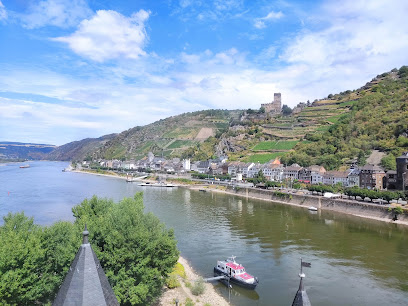
Görresplatz
Explore the heart of Koblenz at Görresplatz, a vibrant square brimming with history, culture, and local charm.
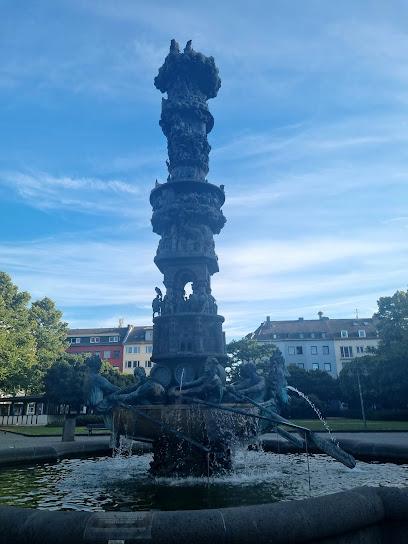
Sooneck Castle
Experience the rich history and breathtaking views of Sooneck Castle, a medieval gem in the heart of the Rhine Valley.
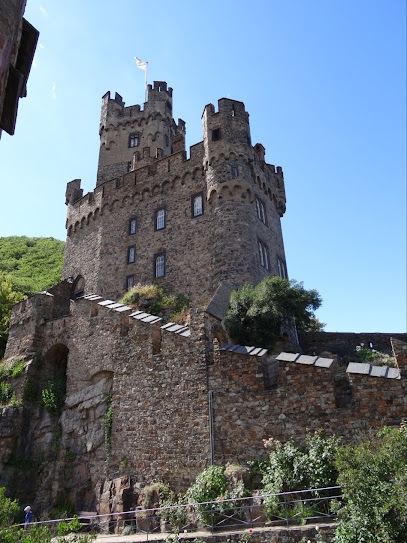
Markets, malls and hidden boutiques
Centro Oberhausen
Explore Centro Oberhausen, Germany's ultimate shopping destination filled with diverse shops, delightful dining, and exciting entertainment options.
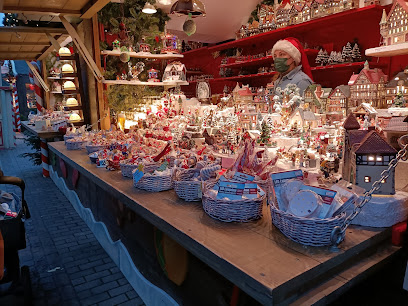
Deutsches Eck
Explore the iconic Deutsches Eck in Koblenz, where the Rhine and Moselle rivers meet, featuring the grand statue of Emperor William I.
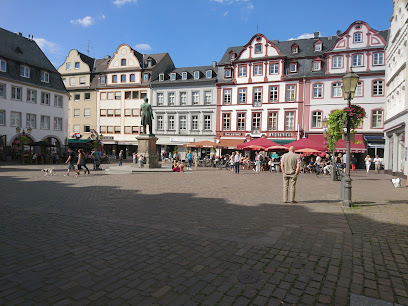
Zweibrücken Fashion Outlet
Explore the Zweibrücken Fashion Outlet, where unbeatable discounts meet a vibrant shopping experience in a modern setting.
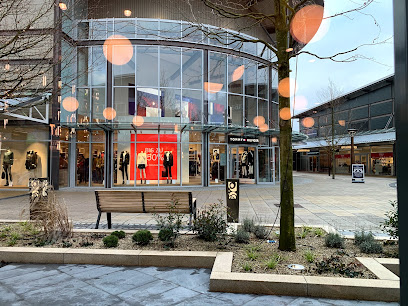
Aquis Plaza
Explore Aquis Plaza in Aachen, a vibrant shopping mall filled with diverse stores, dining options, and entertainment for an unforgettable shopping experience.
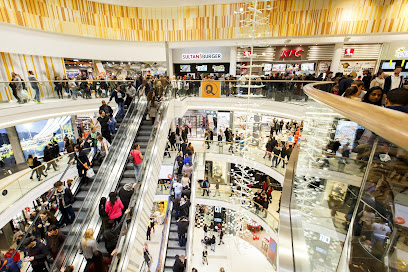
McArthurGlen Designer Outlet Ochtrup
Discover unbeatable deals on designer brands at McArthurGlen Designer Outlet Ochtrup – a must-visit shopping destination for fashion lovers and families.
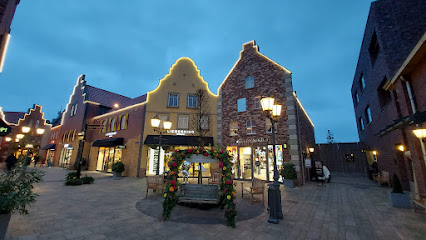
Rhein-Galerie Ludwigshafen
Explore the vibrant Rhein-Galerie Ludwigshafen, a shopping haven filled with diverse stores, delicious dining options, and delightful entertainment.
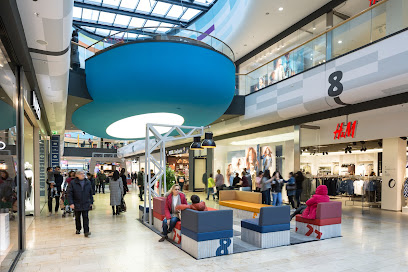
Forum Mittelrhein Koblenz
Discover the bustling Forum Mittelrhein in Koblenz, a shopping paradise with diverse stores, dining options, and vibrant events for every traveler.
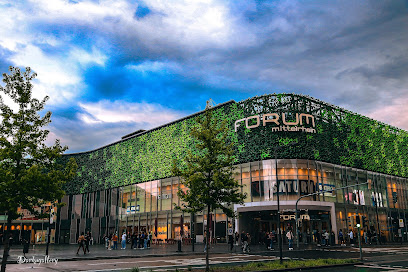
K in Lautern
Experience the best of shopping, dining, and entertainment at K in Lautern, Kaiserslautern's premier shopping mall that caters to every visitor's needs.
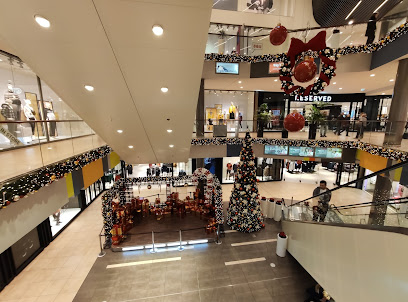
Outlet Montabaur
Discover unbeatable deals and a wide selection of brands at Outlet Montabaur, your ultimate shopping destination in Germany.
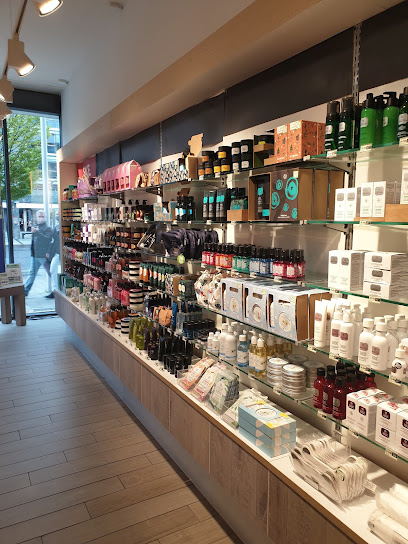
Rathaus-Galerie
Explore the Rathaus-Galerie in Leverkusen, a vibrant shopping mall offering diverse stores, dining options, and entertainment for all ages.
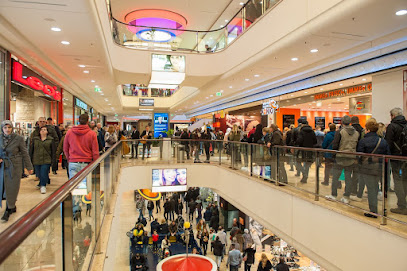
Marksburg
Experience the enchanting history and breathtaking views of Marksburg Castle, a timeless treasure overlooking the Rhine River.
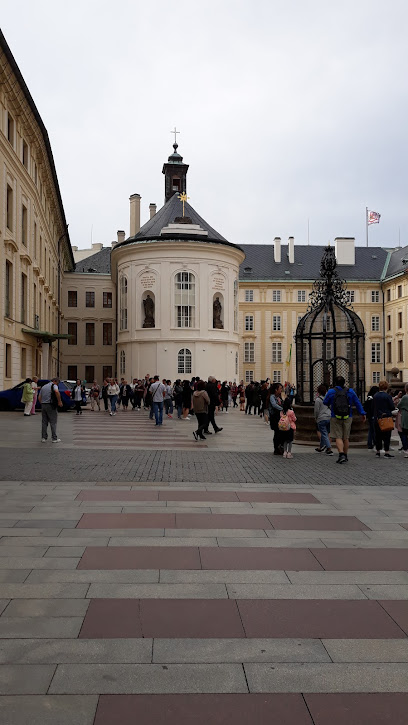
Rheinfels Castle
Explore the enchanting Rheinfels Castle, a historical landmark offering breathtaking views and a glimpse into the rich history of the Rhine Valley.
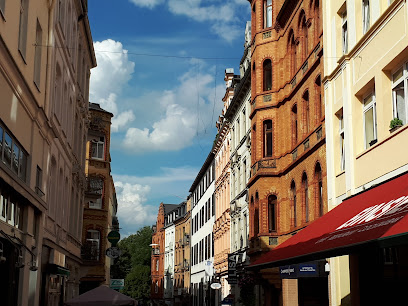
Marktkauf
Discover the ultimate shopping experience at Marktkauf in Weil am Rhein, where local flavors meet convenience and variety.
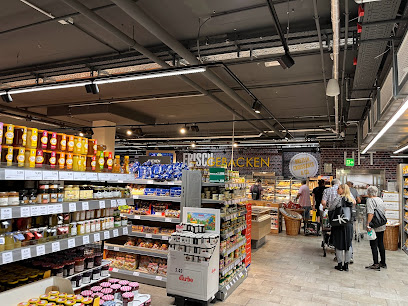
Stolzenfels Castle
Explore the enchanting Stolzenfels Castle, a historical gem with stunning views along the Rhine, perfect for history buffs and nature lovers alike.
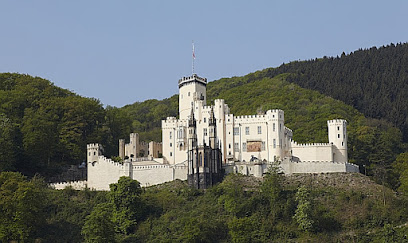
Pfalz Center
Explore the Pfalz Center in Kaiserslautern for a diverse shopping experience, delicious dining options, and vibrant entertainment.
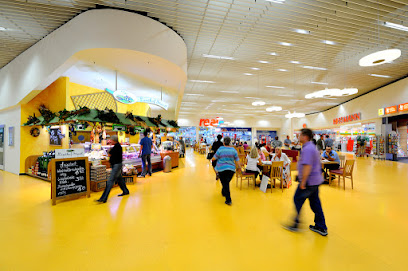
Essential bars & hidden hideouts
The Corkonian Irish pub
Experience authentic Irish hospitality at The Corkonian in Cologne, where hearty food, craft drinks, and a vibrant atmosphere await you.
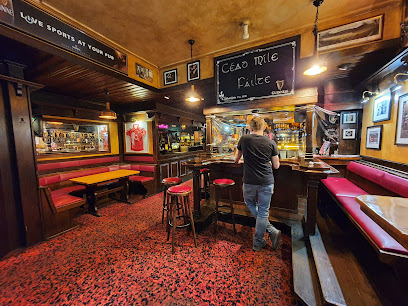
Irish Pub Koblenz
Discover authentic Irish hospitality at Irish Pub Koblenz, where every pint tells a story and every dish is a celebration.
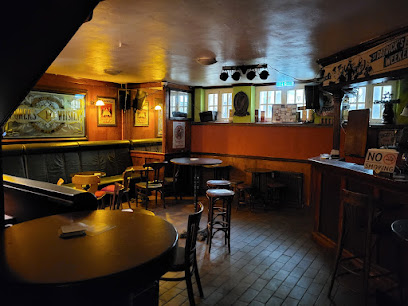
Seiberts - Classic Bar & Liquid Kitchen
Experience the essence of cocktail culture at Seiberts, Cologne's premier bar for innovative drinks and vibrant ambiance.
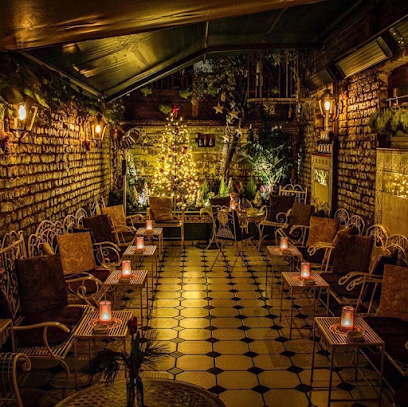
Spökes
Experience the vibrant nightlife at Spökes, Koblenz's top bar for cocktails, pub vibes, and unforgettable evenings.
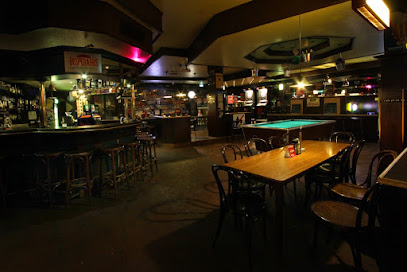
The Copper Pot - Köln
Experience the vibrant atmosphere of The Copper Pot, Cologne's favorite Irish pub, renowned for its live music, cocktails, and hearty cuisine.
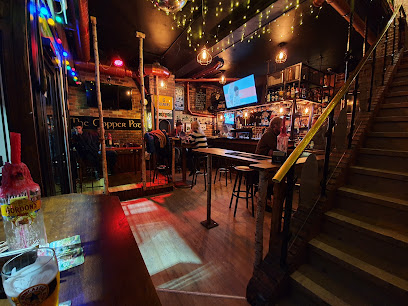
Winninger Weinstuben
Experience the vibrant wine culture of Koblenz at Winninger Weinstuben, where local wines and delicious German cuisine await you.
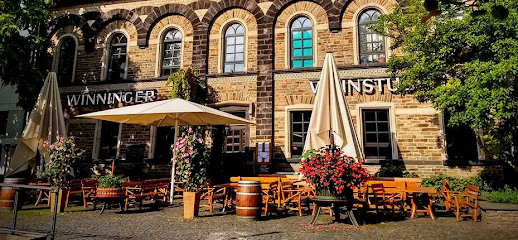
Zum Schiffchen
Discover Zum Schiffchen in Koblenz, where local flavors meet a cozy atmosphere in this delightful pub and restaurant near Liebfrauenkirche.
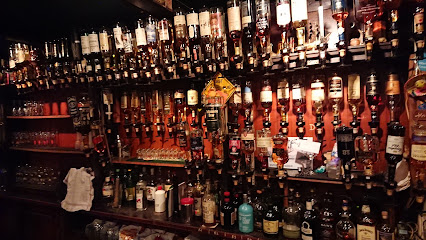
The Dudelsack Scottish Pub & Whisky-Bar
Discover a taste of Scotland in Rüdesheim am Rhein at The Dudelsack Scottish Pub & Whisky-Bar, offering a wide selection of whiskies and traditional Scottish cuisine.
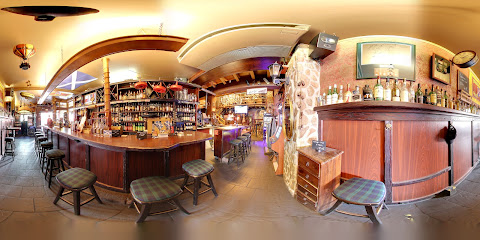
Rote Bar
Experience the vibrant nightlife of Frankfurt at Rote Bar, where expertly crafted cocktails and a chic atmosphere await you.
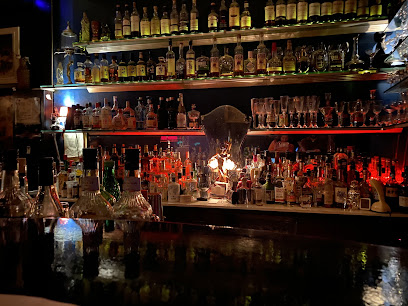
Weinstrand Rüdesheim am Rhein
Experience the serene ambiance and exquisite local wines at Weinstrand Rüdesheim am Rhein, your perfect stop along the Rhine.
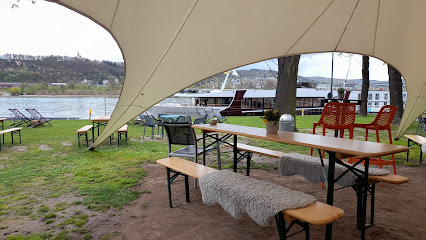
Daddy-O's - Koblenz
Experience the vibrant nightlife of Koblenz at Daddy-O's, where expertly crafted cocktails meet a lively atmosphere.
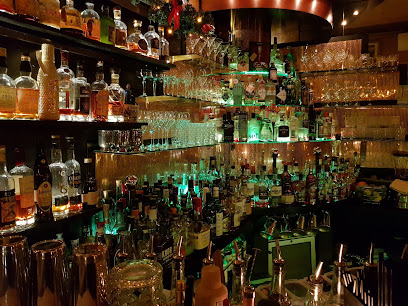
Harry's New York Bar - Frankfurt am Main
Experience the vibrant nightlife of Frankfurt at Harry's New York Bar, where classic American flavors meet a lively New York atmosphere.
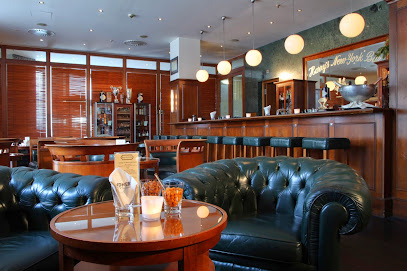
Public Lounge Bar - Koblenz
Discover the lively nightlife at Public Lounge Bar in Koblenz, where innovative cocktails meet a warm and welcoming atmosphere for all.
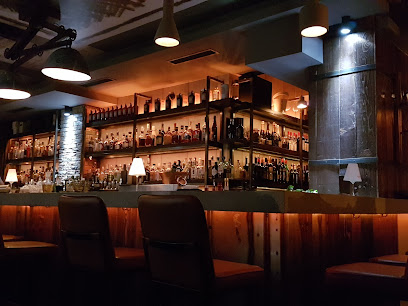
Alte Dorfschänke
Discover Alte Dorfschänke in Rüdesheim am Rhein, a cozy pub offering delicious German cuisine and local wines in a charming setting.
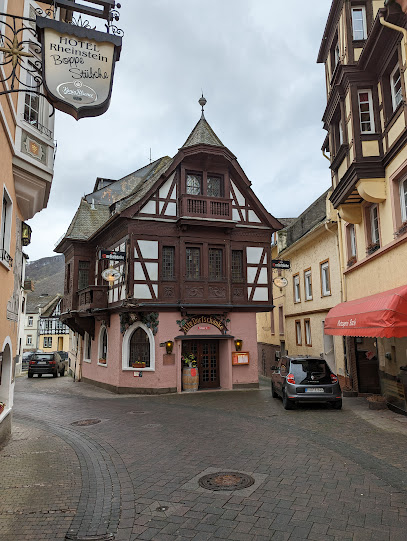
Local Phrases about Rhine Valley
-
- HelloHallo
[HAH-loh] - GoodbyeAuf Wiedersehen
[owf VEE-der-zayn] - YesJa
[yah] - NoNein
[nine] - Please/You're welcomeBitte
[BIT-tuh] - Thank youDanke
[DAHN-kuh] - Excuse me/SorryEntschuldigung
[ent-SHOOL-dee-gung] - How are you?Wie geht es Ihnen?
[vee gayt es ee-nen] - Fine. And you?Gut. Und Ihnen?
[goot oond ee-nen] - Do you speak English?Sprechen Sie Englisch?
[SHPREH-khen zee ENG-lish] - I don't understandIch verstehe nicht
[ikh fer-SHTAY-uh nikht]
- HelloHallo
-
- I'd like to see the menu, pleaseIch möchte die Speisekarte sehen, bitte
[ikh merkhtuh dee SPY-zuh-kahr-tuh zay-en, BIT-tuh] - I don't eat meatIch esse kein Fleisch
[ikh EHS-se kine flysh] - Cheers!Prost!
[prohst] - I would like to pay, pleaseIch möchte bitte zahlen
[ikh merkhtuh BIT-tuh TSAH-len]
- I'd like to see the menu, pleaseIch möchte die Speisekarte sehen, bitte
-
- Help!Hilfe!
[HEEL-fuh] - Go away!Gehen Sie weg!
[GAY-en zee vayg] - Call the Police!Rufen Sie die Polizei!
[ROO-fen zee dee poh-LEE-tsay] - Call a doctor!Rufen Sie einen Arzt!
[ROO-fen zee AI-nen artsht] - I'm lostIch habe mich verirrt
[ikh HAH-buh meekh fer-EERT] - I'm illIch bin krank
[ikh been krank]
- Help!Hilfe!
-
- I'd like to buy...Ich möchte kaufen...
[ikh merkhtuh KOW-fen] - I'm just lookingIch schaue nur
[ikh SHOW-uh noor] - How much is it?Wie viel kostet es?
[vee feel KOS-tet es] - That's too expensiveDas ist zu teuer
[dahs ist tsoo TOY-er] - Can you lower the price?Können Sie den Preis senken?
[KERN-en zee den prize ZEN-ken]
- I'd like to buy...Ich möchte kaufen...
-
- What time is it?Wie spät ist es?
[vee SHPAYT ist es] - It's one o'clockEs ist ein Uhr
[es ist iyn oor] - Half past (10)Halb zehn
[halb tsayn] - MorningMorgen
[MOHR-gun] - AfternoonNachmittag
[NAKH-mit-tahk] - EveningAbend
[AH-bent] - YesterdayGestern
[GESS-tern] - TodayHeute
[HOY-tuh] - TomorrowMorgen
[MOHR-gun] - 1Eins
[ines] - 2Zwei
[tsvai] - 3Drei
[dry] - 4Vier
[feer] - 5Fünf
[foonf] - 6Sechs
[zeks] - 7Sieben
[zee-ben] - 8Acht
[ahkt] - 9Neun
[noyn] - 10Zehn
[tsayn]
- What time is it?Wie spät ist es?
-
- Where's a/the...?Wo ist ein/der...?
[vo ist iyn/der] - What's the address?Was ist die Adresse?
[vas ist dee ah-DRES-uh] - Can you show me (on the map)?Können Sie es mir zeigen (auf der Karte)?
[KERN-en zee es meer tsee-gen (ouf der KAR-tuh)] - When's the next (bus)?Wann kommt der nächste (Bus)?
[vahn kohmt der NEKH-stuh (boos)] - A ticket (to ....)Eine Fahrkarte (nach ....)
[iyn-uh FAHR-kahr-tuh (nahkh)]
- Where's a/the...?Wo ist ein/der...?
History of Rhine Valley
-
The history of the Rhine Valley dates back to the Roman Empire, when the region was known as the province of Germania Superior. The Romans recognized the strategic importance of the Rhine River and established numerous forts and settlements along its banks. The remnants of these ancient structures, such as the Roman city of Mainz (Mogontiacum), offer a glimpse into early European civilization.
-
The Middle Ages were marked by the construction of numerous castles and fortresses along the Rhine River, a testament to the region's turbulent history and strategic importance. Iconic castles like Marksburg, Rheinstein, and Burg Eltz were built to control trade routes and defend against invaders. These castles, often perched atop steep cliffs, now serve as popular tourist attractions, providing a window into medieval life.
-
During the period of the Holy Roman Empire, the Rhine Valley was a center of political and economic power. The cities of Worms, Speyer, and Mainz were significant ecclesiastical centers where Imperial Diets were held. The Rhine's importance as a trade route facilitated the exchange of goods, culture, and ideas, contributing to the flourishing of the Renaissance in the region.
-
The Rhine Valley was heavily impacted by the Thirty Years' War (1618-1648), a devastating conflict that ravaged much of Central Europe. The region's strategic importance made it a frequent battleground, leading to widespread destruction and loss of life. The war significantly altered the political landscape of the Rhine Valley and left a lasting mark on its towns and cities.
-
In the 19th century, the Rhine Valley became a symbol of German Romanticism. Writers, artists, and musicians were inspired by the river's dramatic landscapes and historic ruins. Figures such as the poet Heinrich Heine and composer Richard Wagner drew inspiration from the Rhine, immortalizing its beauty in their works. This period also saw the rise of Rhine tourism, with steamships ferrying visitors along the picturesque river.
-
The Industrial Revolution brought significant changes to the Rhine Valley, transforming it into an industrial powerhouse. Cities like Cologne and Düsseldorf became major industrial and commercial centers, while the river itself served as a vital transportation route for coal, steel, and other goods. The modernization of the region continued into the 20th century, shaping the Rhine Valley into the bustling area it is today.
-
World War II had a profound impact on the Rhine Valley, with cities like Cologne and Düsseldorf suffering extensive bombings. The famous Ludendorff Bridge at Remagen played a crucial role in the Allied advance into Germany. Post-war reconstruction efforts were immense, leading to the rapid rebuilding of cities and infrastructure. This period also marked the beginning of a new era of peace and cooperation in the region.
-
The Upper Middle Rhine Valley, with its rich history and stunning landscapes, was designated a UNESCO World Heritage Site in 2002. This recognition highlights the region's cultural and historical significance, preserving its castles, vineyards, and charming villages for future generations. The Rhine Valley continues to be a popular destination for travelers seeking to experience its storied past and vibrant present.
Rhine Valley Essentials
-
The Rhine Valley in Germany is well-connected and easily accessible from major cities. The nearest international airports are Frankfurt Airport (FRA) and Cologne Bonn Airport (CGN). From these airports, you can take a train or rent a car to reach the Rhine Valley. Trains are frequent and offer scenic routes along the Rhine River. Alternatively, you can drive via the A3 or A61 highways, which provide direct access to various towns in the valley.
-
The Rhine Valley is best explored using a combination of train, boat, and car. Deutsche Bahn (DB) operates an extensive train network connecting towns like Mainz, Koblenz, and Bonn. River cruises offer a unique perspective and stop at picturesque villages and castles along the river. Renting a car provides flexibility to explore off-the-beaten-path locations. Biking is also popular, with well-maintained cycling paths along the river.
-
The official currency in Germany is the Euro (EUR). Credit and debit cards are widely accepted, but it is advisable to carry some cash, especially for smaller establishments, local markets, and in rural areas. ATMs are readily available in towns and cities throughout the Rhine Valley. Contactless payments are becoming more common, but always check if your card is accepted before making a purchase.
-
The Rhine Valley is generally a safe destination for tourists. However, standard precautions should be taken. Keep an eye on your belongings in crowded areas and avoid displaying valuables openly. While the region has low crime rates, it is advisable to be cautious in larger cities like Cologne and Frankfurt, particularly around train stations and tourist hotspots. Always stay vigilant and aware of your surroundings.
-
In case of emergency, dial 112 for immediate assistance. This number connects you to emergency services, including police, fire, and medical assistance. Major towns have hospitals and clinics, and pharmacies are widely available for minor health issues. It is recommended to have travel insurance that covers medical emergencies and to carry a copy of your insurance policy and emergency contact numbers with you.
-
Fashion: Do dress smart-casual, especially when dining out. Avoid overly casual attire like swimwear in towns. Religion: Do respect religious sites by dressing modestly and maintaining silence. Public Transport: Do validate your ticket before boarding trains and buses. Don’t speak loudly or play loud music. Greetings: Do greet people with a firm handshake and maintain eye contact. Eating & Drinking: Do try local wines and cuisine. Don’t rush meals; dining is often a leisurely affair.
-
To experience the Rhine Valley like a local, visit the weekly markets where you can buy fresh produce and regional specialties. Engage with locals in small towns; they are often friendly and willing to share insights about the area’s history and traditions. Don’t miss the wine festivals, which are a great way to taste local wines and enjoy live music. Take a walk through the vineyards or join a guided wine tour for an immersive experience.
Trending Landmarks in Rhine Valley
-
Ehrenbreitstein Fortress
-
Niederwald Monument
-
Marksburg
-
Rheinfels Castle
-
Rhine Gorge
-
Middle Rhine Valley
-
Steingassenturm
-
Burg Reichenberg
-
Rheinbalkon St. Goar
-
Ausblick Burg Rheinfels, Rhein, St. Goar
-
Welterbe Oberes Mittelrheintal
-
Größte freihängende Kuckucksuhr der Welt
-
Aussicht über St. Goar und Rhein
Nearby Cities to Rhine Valley
-
Things To Do in Frankfurt
-
Things To Do in Bonn
-
Things To Do in Echternach
-
Things To Do in Cologne
-
Things To Do in Grevenmacher
-
Things To Do in Vianden
-
Things To Do in Heidelberg
-
Things To Do in Diekirch
-
Things To Do in Remich
-
Things To Do in Clervaux
-
Things To Do in Luxembourg City
-
Things To Do in Wiltz
-
Things To Do in Aachen
-
Things To Do in Dusseldorf
-
Things To Do in Spa











